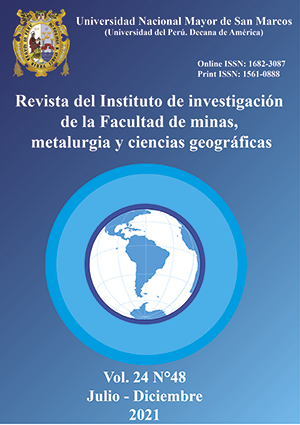Environmental education for the reduction of the use of agrochemicals in the Balsa en Medio community (Ecuador)
DOI:
https://doi.org/10.15381/iigeo.v24i48.20481Keywords:
Environmental education strategies, environmental knowledge, environmental behavior, rural community, Likert scale, training planAbstract
Environmental education is an effective tool to apply sustainable production techniques. The objective of this research was to apply environmental education strategies to reduce the use of agrochemicals in the Balsa en Medio community (Ecuador). Using Likert-type scales, a diagnosis was made of the level of knowledge and environmental behavior of the community members. Afterwards, the training plan was implemented applying environmental strategies on the preparation and application of compost, bioles, bioinsecticides and biopreparations with efficient microorganisms in seasonal crops. Finally, the final environmental knowledge and behavior of the participants was evaluated. The results of the diagnosis revealed that 100% of the participants presented a deficient environmental knowledge, while 98% of participants showed inappropriate environmental behavior. After applying an environmental education program, it was obtained that 21.15% of participants showed excellent environmental knowledge; 61.54% were in the good category and the remaining 17.31% revealed little knowledge; For environmental behavior, 44.23% of participants were adequate, in contrast, 55.77% showed inadequate environmental behavior. The workshops given in the community made it possible to significantly increase the level of environmental knowledge and behavior.
Downloads
Published
Issue
Section
License
Copyright (c) 2021 Ana María Aveiga Ortiz, Hugo Miguel Cobeña Navarrete, César Alfredo Pinargote Zambrano, Oscar Rafael Tinoco Gómez, Francisco Alejandro Alcántara Boza

This work is licensed under a Creative Commons Attribution 4.0 International License.
AUTHORS RETAIN THEIR RIGHTS:
a. Authors retain their trade mark rights and patent, and also on any process or procedure described in the article.
b. Authors retain their right to share, copy, distribute, perform and publicly communicate their article (eg, to place their article in an institutional repository or publish it in a book), with an acknowledgment of its initial publication in the Rev. Inst. investig. Fac. minas metal cienc. geogr.
c. Authors retain theirs right to make a subsequent publication of their work, to use the article or any part thereof (eg a compilation of his papers, lecture notes, thesis, or a book), always indicating the source of publication (the originator of the work, journal, volume, number and date).























